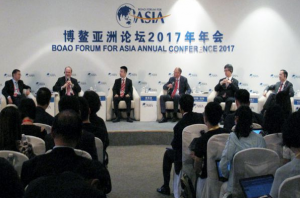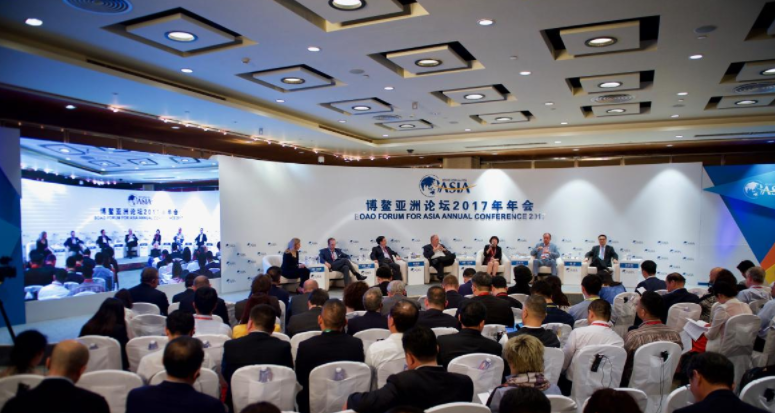aNewDomain — Bo’ao, Hainan, China — U.S. Pres. Donald Trump may be pushing away from the global business power table, but China’s settling firmly into what it sees as its new role: Globalization leader.
— Bo’ao, Hainan, China — U.S. Pres. Donald Trump may be pushing away from the global business power table, but China’s settling firmly into what it sees as its new role: Globalization leader.
That much was evident at the Boao Forum for Asia (BFA 2017), which is wrapping up today here in Bo’ao, a laid back beach town on China’s southernmost province of Hainan.
The annual Asian powerfest this year drew seven Asian heads of state, 82 foreign affairs ministers, 40 international academics and 32 Fortune Global 500 CEOs. The theme at the Boao Forum this time around was globalization and free trade.

With rising US and European trends toward protectionism, globalization “has entered a critical moment,” BFA secretary general Zhou Wenzhong said at the show’s opening ceremony on Wednesday.
Zhou, who was China’s ambassador to the United States from 2005 to 2010, added that “globalization must not” end.
And in a comment echoed again and again by Chinese politicians, academics and executives throughout the conference, he said China will step up.
China will take the lead in the interest of free market forces, and it will assume its place as a leader in globalization, he said.
“All countries need to collaborate to explore inclusive and shared development, especially at a time when the world economy is sluggish,” he said, adding: “Globalization is not some abstract concept.”
That was a reference to China ‘s energetic Belt and Road Initiative Forum (BRF), a multibillion dollar project kicked off by China President Xi Jinping three years ago at the World Economic Forum. The Bridge and Road effort so far funds and manages Chinese construction and infrastructure ventures for and with projects in India, Pakistan and a dozen other countries in the region.
‘s energetic Belt and Road Initiative Forum (BRF), a multibillion dollar project kicked off by China President Xi Jinping three years ago at the World Economic Forum. The Bridge and Road effort so far funds and manages Chinese construction and infrastructure ventures for and with projects in India, Pakistan and a dozen other countries in the region.
What’s evident is that China sees more than just the opening “America First” promoter Pres. Donald Trump is leaving. It sees globalization and a more concentrated focus on the free market as necessary for the region’s continued growth.
“Blaming globalization can work to nobody’s interest,” said Jin Liqun, president of the Asian Infrastructure Investment Bank (AIIB), adding that it’s a win-win for all involved.
The AIIB will work on coordinated infrastructural investments with partner countries, Jin said.
Jenny Shipley, who is the former Prime Minister of New Zealand, agreed, saying that strategic investment lies at the heart of China’s globalization aims.
“We need to put physical infrastructures in place, so that people can have a better chance to engage with globalization,” she said at the conference.
New Zealand was among the first countries to join AIIB, whose work nearly demonstrates what “enhancing mobility” looks like.
“If we go further to use the AIIB and other development banking facilities to develop infrastructure, telecom, digitalization, this would pave the foundation for globalization,” China’s central bank governor Zhou Xiaochuan said.
The importance of inclusive globalization, especially during a global economic downturn, is a big theme here at the conference. Economies — and especially emergent ones — need the globalization jumpstart during tough times, most said.
A new US and European emphasis on protectionism threatens development across the board, said US-based Caterpillar VP Chen Qihua.
It’s a direct threat, he added, to the sustainability of critical world trade initiatives.
Focusing on globalization and global economic governance is a natural move for China at any rate. Because it is so dependent on exports, China is “arguably the biggest beneficiary of globalization.”
The emphasis on China taking up the reins of globalization leadership here at the Boao Forum comes on the heels of Pres. Xi’s January 19, 2017 speech at the World Economic Forum in Davos, which presented the nation’s goals of increased global economic leadership and responsibilities.
“Just blaming economic globalization for the world’s problems is inconsistent with reality, and it will not help in solving the problems,” Xi said at the time. “We should adapt to and guide economic globalization, cushion its negative impact, and deliver its benefits to all countries and nations.”
Watch for our upcoming series on a newly global China this coming week. The first installment deals with the challenges Chinese global businesses will face in their attempts to reinvent themselves as true multinationals.
For aNewDomain in Bo’ao, Hainan, China, I’m Gina Smith.
Above: Downtown Bo’ao.













